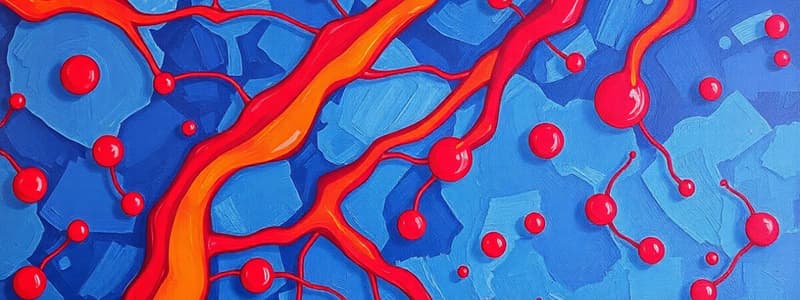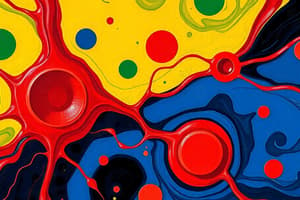Podcast
Questions and Answers
Which of the following lists the correct sequence of hemostasis from start to finish?
Which of the following lists the correct sequence of hemostasis from start to finish?
Vascular spasm, platelet plug formation, coagulation
The final step in clot formation is:
The final step in clot formation is:
- the release of chemical by platelets.
- platelet plug formation.
- prothrombin → thrombin.
- fibrinogen → fibrin. (correct)
- formation of prothrombin activator.
Match the following term with its function: Form a temporary plug at the site of bleeding
Match the following term with its function: Form a temporary plug at the site of bleeding
Platelets = Form a temporary plug at the site of bleeding
Match the following blood group with its description: Has both anti-A and anti-B antibodies.
Match the following blood group with its description: Has both anti-A and anti-B antibodies.
The extrinsic pathway of blood clotting is triggered by tissue factor.
The extrinsic pathway of blood clotting is triggered by tissue factor.
Match the following term with its correct description: Heparin.
Match the following term with its correct description: Heparin.
Blood type is determined by what?
Blood type is determined by what?
Match the following term with its correct description: Would have type A and B agglutinogens (RBC antigens)
Match the following term with its correct description: Would have type A and B agglutinogens (RBC antigens)
Platelets are derived from __________.
Platelets are derived from __________.
Match the following component of the clotting mechanism with the appropriate function: Tissue factor (TFIII), or tissue thromboplastin
Match the following component of the clotting mechanism with the appropriate function: Tissue factor (TFIII), or tissue thromboplastin
Match the following term with its correct desciption: Prothrombin activator
Match the following term with its correct desciption: Prothrombin activator
Which antibodies would be found in the serum of a person with AB blood?
Which antibodies would be found in the serum of a person with AB blood?
Match the following component of the clotting mechanism with the appropriate function: Serum.
Match the following component of the clotting mechanism with the appropriate function: Serum.
Erythroblastosis fetalis is caused by __________.
Erythroblastosis fetalis is caused by __________.
Eighty-five percent of Americans carry the __________ Rh agglutinogen on their red blood cells (RBCs).
Eighty-five percent of Americans carry the __________ Rh agglutinogen on their red blood cells (RBCs).
Match the following term with its correct description: Would make antibodies to the B agglutinogen but not the A agglutinogen
Match the following term with its correct description: Would make antibodies to the B agglutinogen but not the A agglutinogen
Match the following blood group with its description: Has only anti-A antibody.
Match the following blood group with its description: Has only anti-A antibody.
Identify the event of hemostasis indicated by "C."
Identify the event of hemostasis indicated by "C."
Match the following term with its correct description: Platelet-derived growth factor.
Match the following term with its correct description: Platelet-derived growth factor.
Match the following blood group with its description: Has only antigen A.
Match the following blood group with its description: Has only antigen A.
Which of the following plasma expanders would be associated with the least complications?
Which of the following plasma expanders would be associated with the least complications?
Platelets are derived from:
Platelets are derived from:
Match the following blood group with its description: Has both antigens A and B
Match the following blood group with its description: Has both antigens A and B
Match the following term with its function: Granules contain the anticoagulant, heparin.
Match the following term with its function: Granules contain the anticoagulant, heparin.
Match the following component of the clotting mechanism with the appropriate function: Von Willebrand factor (VWF)
Match the following component of the clotting mechanism with the appropriate function: Von Willebrand factor (VWF)
Match the following term with its correct description: Would make antibodies to the A and B agglutinogens
Match the following term with its correct description: Would make antibodies to the A and B agglutinogens
Match the following type of blood cell formed element with the appropriate description: Platelets.
Match the following type of blood cell formed element with the appropriate description: Platelets.
Flashcards
Hemostasis Sequence
Hemostasis Sequence
Vascular spasm, platelet plug formation, coagulation.
Final Step in Clot Formation
Final Step in Clot Formation
Fibrinogen converts to fibrin.
What is the Function of Platelets
What is the Function of Platelets
Form a temporary plug at a bleeding site.
Blood Group O Antibodies
Blood Group O Antibodies
Signup and view all the flashcards
Extrinsic Pathway Trigger
Extrinsic Pathway Trigger
Signup and view all the flashcards
Function of Heparin
Function of Heparin
Signup and view all the flashcards
Blood Type Determination
Blood Type Determination
Signup and view all the flashcards
Thrombin Function
Thrombin Function
Signup and view all the flashcards
A and B Agglutinogens (RBC antigens)
A and B Agglutinogens (RBC antigens)
Signup and view all the flashcards
Platelet Source
Platelet Source
Signup and view all the flashcards
Tissue Factor (TFIII) Function
Tissue Factor (TFIII) Function
Signup and view all the flashcards
Prothrombin Activator Function
Prothrombin Activator Function
Signup and view all the flashcards
Antibodies in AB Blood
Antibodies in AB Blood
Signup and view all the flashcards
Serum Definition
Serum Definition
Signup and view all the flashcards
Erythroblastosis Fetalis Cause
Erythroblastosis Fetalis Cause
Signup and view all the flashcards
Common Rh Agglutinogen
Common Rh Agglutinogen
Signup and view all the flashcards
Antibodies to B Agglutinogen
Antibodies to B Agglutinogen
Signup and view all the flashcards
Blood Group B antibody
Blood Group B antibody
Signup and view all the flashcards
Event "C" of Hemostasis
Event "C" of Hemostasis
Signup and view all the flashcards
PDGF Function
PDGF Function
Signup and view all the flashcards
Blood group A.
Blood group A.
Signup and view all the flashcards
Event "A" of Hemostasis
Event "A" of Hemostasis
Signup and view all the flashcards
Plasma Expander with Least Complications
Plasma Expander with Least Complications
Signup and view all the flashcards
Origin of Platelets
Origin of Platelets
Signup and view all the flashcards
Antigens A and B
Antigens A and B
Signup and view all the flashcards
Basophils
Basophils
Signup and view all the flashcards
VWF Function
VWF Function
Signup and view all the flashcards
A and B antibodies
A and B antibodies
Signup and view all the flashcards
Event "B" of Hemostasis
Event "B" of Hemostasis
Signup and view all the flashcards
Antibodies to the A agglutinogen
Antibodies to the A agglutinogen
Signup and view all the flashcards
Study Notes
- Hemostasis occurs in the sequence of vascular spasm, platelet plug formation, and coagulation.
- The final step in clot formation is fibrinogen converting into fibrin.
- Platelets form a temporary plug at the site of bleeding.
- Blood group O has both anti-A and anti-B antibodies.
- The extrinsic pathway of blood clotting is triggered by tissue factor.
- Heparin inhibits coagulation.
- Blood type is determined by glycoproteins present on the surface of erythrocytes.
- Thrombin converts fibrinogen to fibrin.
- A person with type AB blood would have type A and B agglutinogens (RBC antigens).
- Platelets are derived from megakaryocytes.
- Tissue factor (TFIII), or tissue thromboplastin, triggers the "shortcut" extrinsic mechanism that bypasses several steps of the intrinsic pathway.
- Prothrombin activator generates thrombin.
- Neither anti-A nor anti-B antibodies are found in the serum of a person with AB blood.
- Serum is plasma minus the clotting proteins.
- Erythroblastosis fetalis is caused by an Rh incompatibility between an Rh-negative mother and her Rh-positive baby during pregnancy.
- Eighty-five percent of Americans carry the D Rh agglutinogen on their red blood cells (RBCs).
- A person with type A blood would make antibodies to the B agglutinogen but not the A agglutinogen.
- Blood group B has only anti-A antibody.
- The event of hemostasis indicated by "C" is coagulation.
- Platelet-derived growth factor stimulates blood vessel healing.
- Blood group A has only antigen A.
- The event of hemostasis indicated by "A" is vascular spasm.
- Ringer's solution as a plasma expander would be associated with the least complications.
- Platelets are derived from megakaryocytes in bone marrow.
- Blood group AB has both antigens A and B.
- Basophil granules contain the anticoagulant, heparin.
- Von Willebrand factor (VWF) assists platelets to adhere to collagen fibers.
- A person with type O blood would make antibodies to the A and B agglutinogens.
- The event of hemostasis indicated by "B" is platelet plug information.
- A person with type B blood would make antibodies to the A agglutinogen but not the B agglutinogen.
- Platelets are not complete cells, but fragments of cells and are very small compared to other cellular components
- Blood group AB has both antigens A and B.
- A person with type AB blood would have type A and B agglutinogens (RBC antigens)
Studying That Suits You
Use AI to generate personalized quizzes and flashcards to suit your learning preferences.
Description
Explore hemostasis, the process of blood clotting, including vascular spasm, platelet plug formation, and coagulation. This includes the roles of fibrin, platelets, blood groups, and the extrinsic pathway. Also covered are anticoagulants like heparin, blood type determination, and the functions of thrombin and prothrombin activator.




